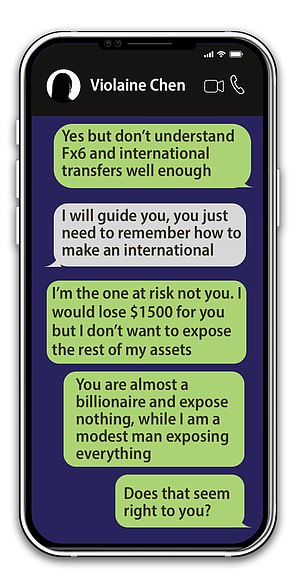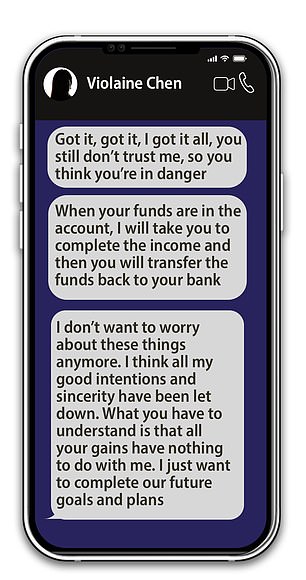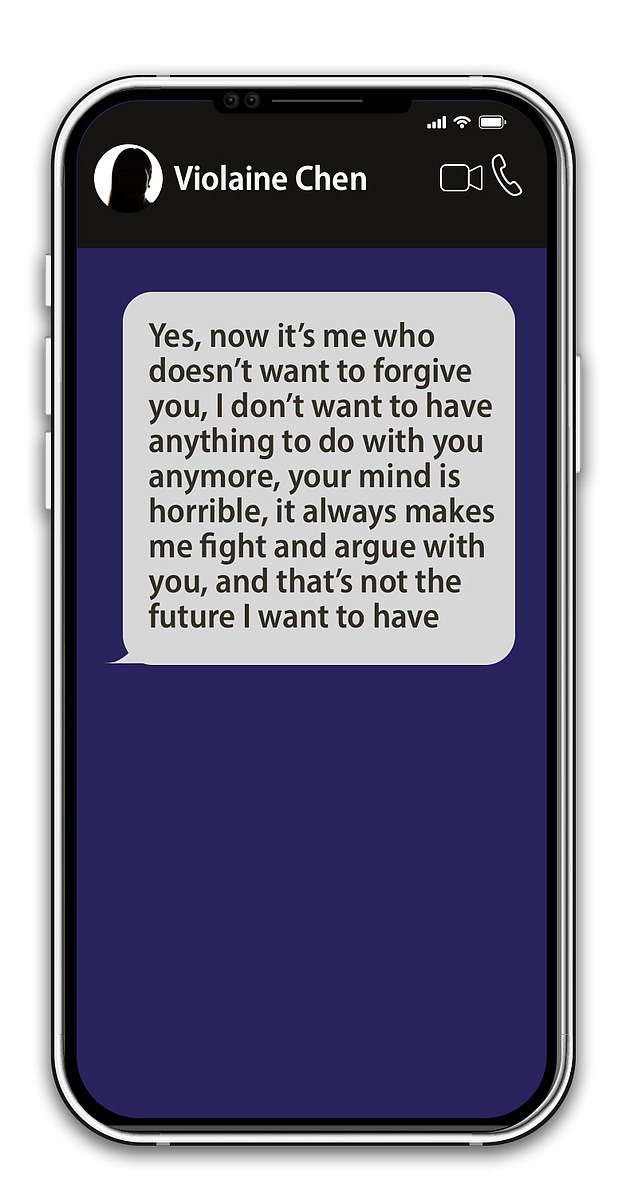Read the sickening text messages that cost one 75-year-old his entire $715,000 life savings
A 75-year-old man has shared the heartbreaking text messages that cost him his entire $715,000 life savings in a sickening months-long “pig slaughter” scam.
The man who did not want to be named told The Wall Street Journal how the elaborate trick convinced him that a younger woman had fallen in love with him and needed his help.
The scam started in May last year when a woman posing as a lonely but successful Chinese 37-year-old woman from San Francisco messaged him on LinkedIn.
Over the next three months, she convinced him to transfer his entire savings to a fake trading platform, promising that they could get married and live together with the return on his investment.
When he had used up all his assets (and those of his partner), the woman stopped responding to his messages and his money was gone.
A 75-year-old man was conned out of $715,000 in savings after falling for a ‘pig slaughterhouse’ scam targeting lonely and vulnerable people online
The man is a 75-year-old professional living in the American Midwest.
He is one of millions of people worldwide targeted in a so-called pig slaughter scam, where strangers entice vulnerable and lonely people online, building trust and convincing them to put money into fake schemes.
Once they have taken the money, the scammers – who mainly pose as beautiful young women – disappear.
In reality, many of the scammers are men based in complexes run by Chinese criminal syndicates in parts of Southeast Asia and West Africa, The Journal said.
Many of the scammers are themselves victims of human trafficking and have been trained and given phones and scripts to track their targets under the threat of violence.
In this case, the woman contacted the man via LinkedIn, exchanging pleasantries before suggesting he switch to WhatsApp.
The man told her he had a modest retirement fund but still worked full-time and had lived with his partner of 40 years, whom he said had grown apart.
She sent him photos of “herself” in high-end restaurants, shopping and traveling, and told him she had moved to the US from China eight years earlier.
She said she was lonely and longed for a companion and was just looking for true love.
They bonded over their love of food, travel, fitness and pets, and she sent him detailed descriptions of her meals and workouts.
They had a few brief phone conversations and a video call at first – probably made by a model in one of the buildings – but then communicated exclusively via text.


The scammer posed as a Chinese woman called Violaine and contacted the man via LinkedIn before suggesting he move to WhatsApp. The woman claimed she was lonely and looking for true love, with the pair even planning a road trip together


The scammer began telling the man about her “uncle” company and tricked him into transferring more than $700,000 to a “trading platform.” She helped him set up the account and assured him he could trust her
Once they built a bond, she started telling him about her “uncle’s” company, which she said made a fortune trading gold futures on a platform called FX6.
Over the next three months, she manipulated and persuaded the man to transfer $715,000 to the platform, which then disappeared.
She helped him set up an account and transfer the money, promising, “We will be very happy in the future… I really thank God for letting me meet you.”
In between reassuring him that he could “trust me,” the pair planned a road trip together that she said they could take with the return on his investments.
When he doubted her or wondered why he had to transfer the money, she made him feel guilty by saying, “Your distrust of me made me feel again the fickleness of men.”
As the amounts he transferred to the program increased, his bank began warning him that he might be a victim of the scam, but with its help, he ignored the bank and continued making larger payments.
He sold his shares and took out a loan to meet the growing payments.
When he said he had nothing left to invest, she disappeared.

When he doubted her or wondered why he had to transfer the money, the scammer made him feel guilty

When the man had nothing left to invest, ‘Violaine’ stopped responding to his messages and disappeared
He sent her desperate messages, begging her to respond and explain what had happened.
In one he said: ‘Do me a favor and just shoot me. I have nothing to live for. No money, no family and no soulmate.’
She didn’t respond.
He reported her to the FBI, but nothing came of his report. The FBI told the Journal that the complaints are being reviewed and forwarded to appropriate law enforcement agencies.
He didn’t get any of his money back and has finally accepted that it was a scam.
Now he wants to raise awareness about the plans and how easy it is to be targeted. He told the Journal, “She got me hooked.”
